Today my blog is six years old. Reading has always been a great pleasure and I began my blog to try and capture some of that pleasure. So, I thought that for today’s anniversary post I’d look back at some of the books I’ve read over the last six years that stand out in my mind as being most enjoyable.
It’s difficult with so many books to choose from and there are plenty more I could highlight, but here are six of the best fiction books and six of the best non fiction. I think the books I’ve chosen show the range of books that I enjoy – historical fiction, crime fiction, contemporary fiction, autobiography, history, poetry (just a few poets) and philosophy/psychology.
Over these last six years I’ve seen blogs come and go and there have been times when I’ve considered giving up blogging, but somehow I’ve hung on and looking back over my blog to do this post has proved to me the value of keeping it – it’s not just a record of what I’ve read but also a reminder of what I thought of the books too. And I hope my posts do convey the pleasure reading gives me.
Fiction (one from each year)
2007 –
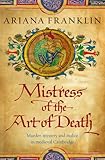 Mistress of the Art of Death by Ariana Franklin. This is historical crime fiction set in Cambridge in 1170 during the reign of Henry II. A child has been murdered and others have disappeared.The Jews are suspected and Henry is keen to find the culprit as the Jewish community in Cambridge are major contributors to his Exchequer. He enlists the help of Simon of Naples, who is accompanied by Adelia, a female doctor who specialises in studying corpses. I loved this book, reminiscent of The Canterbury Tales. The medieval world is vividly brought to life and it’s a fascinating murder mystery.
Mistress of the Art of Death by Ariana Franklin. This is historical crime fiction set in Cambridge in 1170 during the reign of Henry II. A child has been murdered and others have disappeared.The Jews are suspected and Henry is keen to find the culprit as the Jewish community in Cambridge are major contributors to his Exchequer. He enlists the help of Simon of Naples, who is accompanied by Adelia, a female doctor who specialises in studying corpses. I loved this book, reminiscent of The Canterbury Tales. The medieval world is vividly brought to life and it’s a fascinating murder mystery.
2008 –
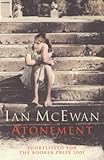 Atonement by Ian McEwan – a book that moved me to tears. It begins on a hot day in the summer of 1935 when Briony, then aged thirteen witnesses an event between her older sister Cecelia and her childhood friend Robbie that changed all three of their lives. It’s a captivating story of the use of imagination, shame and forgiveness, love, war and class-consciousness in England in the twentieth century.
Atonement by Ian McEwan – a book that moved me to tears. It begins on a hot day in the summer of 1935 when Briony, then aged thirteen witnesses an event between her older sister Cecelia and her childhood friend Robbie that changed all three of their lives. It’s a captivating story of the use of imagination, shame and forgiveness, love, war and class-consciousness in England in the twentieth century.
From 2009 –
 Fire in the Blood by Irène Némirovsky – a gem of a book, this is set in a small village based on Issy-l’Eveque between the two world wars. The narrator is Silvio looking back on his life and gradually secrets that have long been hidden rise to the surface, disrupting the lives of the small community. It is an intense story of life and death, love and burning passion. It’s about families and their relationships €“ husbands and wives, young women married to old men, lovers, mothers, daughters and stepdaughters.
Fire in the Blood by Irène Némirovsky – a gem of a book, this is set in a small village based on Issy-l’Eveque between the two world wars. The narrator is Silvio looking back on his life and gradually secrets that have long been hidden rise to the surface, disrupting the lives of the small community. It is an intense story of life and death, love and burning passion. It’s about families and their relationships €“ husbands and wives, young women married to old men, lovers, mothers, daughters and stepdaughters.
From 2010 –
 Wolf Hall by Hilary Mantel – this is my favourite, so far, of Mantel’s trilogy about the story of Thomas Cromwell, the son of a blacksmith, and his political rise, set against the background of Henry VIII’s England.This first book in the trilogy is about his struggle with the King over his desire to marry Anne Boleyn. It transported me back to that time, with Mantel’s descriptions of the pageantry, the people, the places and the beliefs and attitudes of the protagonists. A wonderful book.
Wolf Hall by Hilary Mantel – this is my favourite, so far, of Mantel’s trilogy about the story of Thomas Cromwell, the son of a blacksmith, and his political rise, set against the background of Henry VIII’s England.This first book in the trilogy is about his struggle with the King over his desire to marry Anne Boleyn. It transported me back to that time, with Mantel’s descriptions of the pageantry, the people, the places and the beliefs and attitudes of the protagonists. A wonderful book.
From 2011 –
 Blood Harvest by S J Bolton. Crime fiction set in the fictional town of Heptonclough in Lancashire where the Fletcher family have just moved into a new house built on land right next to the boundary wall of the churchyard. I was completely convinced not only by the setting but also by the characterisation that the place and the people in this book were real. It’s full of tension, terror and suspense and I was in several minds before the end as to what it was all about. I had an inkling but I hadn’t realised the full and shocking truth.
Blood Harvest by S J Bolton. Crime fiction set in the fictional town of Heptonclough in Lancashire where the Fletcher family have just moved into a new house built on land right next to the boundary wall of the churchyard. I was completely convinced not only by the setting but also by the characterisation that the place and the people in this book were real. It’s full of tension, terror and suspense and I was in several minds before the end as to what it was all about. I had an inkling but I hadn’t realised the full and shocking truth.
From 2012 –
 The Secret River by Kate Grenville €“ this book completely captivated me and I could hardly wait to get back to it each time I had to put it down. It’s historical fiction, straight-forward story-telling following William Thornhill from his childhood in the slums of London to his new life in Australia in the early 19th century. Dramatic, vivid and thought-provoking, this novel raises several issues €“ about crime and punishment, about landownership, defence of property, power, class and colonisation.
The Secret River by Kate Grenville €“ this book completely captivated me and I could hardly wait to get back to it each time I had to put it down. It’s historical fiction, straight-forward story-telling following William Thornhill from his childhood in the slums of London to his new life in Australia in the early 19th century. Dramatic, vivid and thought-provoking, this novel raises several issues €“ about crime and punishment, about landownership, defence of property, power, class and colonisation.
Non Fiction:
2007 –
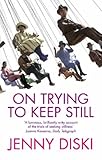 On Trying to Keep Still by Jenny Diski about her travels during a year when she visited New Zealand, spent three months in a cottage in Somerset and went to sample the life of the Sami people of Swedish Lapland. This is also a personal memoir, and is about being still, being alone, wanting to be alone, phobias and the problems of coping with life and especially with aging. I can indentify with her feelings such as not wanting to make a noise in case people notice that I’m there, not wanting others to worry about me, and worrying that others are worrying about me; feeling the need to do something such as going out for a walk €“ not the desire to do it for itself but the feeling that I should want to. It’s a moving, amusing, thought-provoking and original book.
On Trying to Keep Still by Jenny Diski about her travels during a year when she visited New Zealand, spent three months in a cottage in Somerset and went to sample the life of the Sami people of Swedish Lapland. This is also a personal memoir, and is about being still, being alone, wanting to be alone, phobias and the problems of coping with life and especially with aging. I can indentify with her feelings such as not wanting to make a noise in case people notice that I’m there, not wanting others to worry about me, and worrying that others are worrying about me; feeling the need to do something such as going out for a walk €“ not the desire to do it for itself but the feeling that I should want to. It’s a moving, amusing, thought-provoking and original book.
2008 –
 Our Longest Days by the writers of Mass Observation, edited by Sandra Koa Wing. In August 1939, with war approaching, the Mass Observation Organisation asked its panel to keep diaries to record their daily lives and selections from fifteen of these diaries are included in Our Longest Days. Because they are personal accounts there is that sense of being actually there during the air raids, hearing Churchill’s speeches, reading the newspaper reports, experiencing the grief at the number of casualties and deaths and the terrible devastation of the war, the food and clothes rationing and the excitement of D-Day.
Our Longest Days by the writers of Mass Observation, edited by Sandra Koa Wing. In August 1939, with war approaching, the Mass Observation Organisation asked its panel to keep diaries to record their daily lives and selections from fifteen of these diaries are included in Our Longest Days. Because they are personal accounts there is that sense of being actually there during the air raids, hearing Churchill’s speeches, reading the newspaper reports, experiencing the grief at the number of casualties and deaths and the terrible devastation of the war, the food and clothes rationing and the excitement of D-Day.
also from 2008:
Robert Frost (The Illustrated Poets series) – a slim little book with a selection of Frost’s verse illustrated by American, English and French painters of the nineteenth and twentieth centuries. Frost’s poems are written in deceptively simple language but they convey great depth of meaning. They are compact and powerful. And the illustrations are beautiful.
2009 –
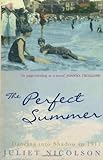 The Perfect Summer by Juliet Nicolson, a fascinating look at life in Britain during the summer of George V’s Coronation year, 1911. It was one of the hottest years of the twentieth century and also a summer of discontent as the country was almost brought to a standstill by industrial strikes and the enormous gap between the privileged and the poor was becoming more and more obvious. It covers a wide spectrum €“ from King George’s accession to the throne to débutantes politicians, poets, factory workers, writers, and women trade unionists. There is little about the suffragettes €“ they agreed a summer truce for the Coronation.
The Perfect Summer by Juliet Nicolson, a fascinating look at life in Britain during the summer of George V’s Coronation year, 1911. It was one of the hottest years of the twentieth century and also a summer of discontent as the country was almost brought to a standstill by industrial strikes and the enormous gap between the privileged and the poor was becoming more and more obvious. It covers a wide spectrum €“ from King George’s accession to the throne to débutantes politicians, poets, factory workers, writers, and women trade unionists. There is little about the suffragettes €“ they agreed a summer truce for the Coronation.
2010 –
 Agatha Christie: an Autobiography As well as being a record of her life as she remembered it and wanted to relate it, it’s also full of her thoughts and reflections on life and writing. She wrote about her childhood, teenage years, friends and family, and her marriage to Archibald Christie; but although she wrote about their divorce she didn’t write about her disappearance in 1926. She wrote about her travels around the world, the two world wars, her interest and involvement with archaeology and her marriage to Max Mallowan. I read it in short sections and felt quite sad when I came to the end. It was like having a daily chat with Agatha.
Agatha Christie: an Autobiography As well as being a record of her life as she remembered it and wanted to relate it, it’s also full of her thoughts and reflections on life and writing. She wrote about her childhood, teenage years, friends and family, and her marriage to Archibald Christie; but although she wrote about their divorce she didn’t write about her disappearance in 1926. She wrote about her travels around the world, the two world wars, her interest and involvement with archaeology and her marriage to Max Mallowan. I read it in short sections and felt quite sad when I came to the end. It was like having a daily chat with Agatha.
2011 –
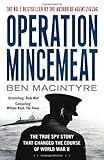 Operation Mincemeat by Ben Macintyre – this is about the Allies’ deception plan code-named Operation Mincemeat in 1943, which underpinned the invasion of Sicily. It was framed around a man who never was. The plan was to take a dead body, equipped with false documents, deposit it on a beach in Spain, so that it would be passed over to the Germans and divert them from the real target. Totally outside my usual range of reading this was so far-fetched as to be almost like reading a fictional spy story. I marvelled at the ingenuity of the minds of the plans’ originators and the daring it took to carry it out.
Operation Mincemeat by Ben Macintyre – this is about the Allies’ deception plan code-named Operation Mincemeat in 1943, which underpinned the invasion of Sicily. It was framed around a man who never was. The plan was to take a dead body, equipped with false documents, deposit it on a beach in Spain, so that it would be passed over to the Germans and divert them from the real target. Totally outside my usual range of reading this was so far-fetched as to be almost like reading a fictional spy story. I marvelled at the ingenuity of the minds of the plans’ originators and the daring it took to carry it out.
PS – I’ve enjoyed compiling this post so much that I’m thinking of doing something similar for the paintings and places I’ve written about.
 BooksPlease is 7 Today!
BooksPlease is 7 Today! Mistress of the Art of Death
Mistress of the Art of Death 




 On Trying to Keep Still
On Trying to Keep Still

 The Perfect Summer
The Perfect Summer Agatha Christie: an Autobiography
Agatha Christie: an Autobiography Operation Mincemeat
Operation Mincemeat